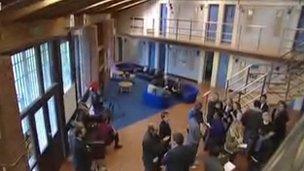Boris Johnson's flagship crime scheme will end
- Published

The Mayor claimed a new wing was cutting reoffending rates from 80% to 19%
The mayor of London's key programme to tackle teenage crime will not be continued when the money runs out after the election, it has been confirmed.
Project Daedalus aimed to help selected inmates at Feltham Young Offenders' Institution get a job or go back to school after they were released.
A preliminary report into the project, to be released on Thursday, found that only half of inmates did this.
Boris Johnson insisted it had made progress.
He said it looked like there had been a "substantial reduction in reoffending".
But the report found that only half of inmates went into education, training or employment after release, and just one in six stayed in such an occupation for six months.
Project Daedalus cost nearly £2.5m, which mainly came from a European fund.
But when that money ends, so will the programme.
Prisons Minister Crispin Blunt revealed the scheme will not continue after May and said the mayor now wants to set up a new initiative.
That will be focused on London as a whole and also targeted at younger boys on remand, as well as some convicted of crimes.
Tottenham MP David Lammy, who has visited the Feltham unit and supported the project, is angry it has not delivered what was hoped.
He said: "We're being told that the money has dried up, it's been cancelled and it hasn't been evaluated. That's unacceptable.
"A few years ago this was the flagship - you can't just discard it quietly, you've got to explain why you've decided to destroy it."
'Positive contribution'
Central to the project were resettlement brokers, charity workers who helped inmates adjust to the outside.
Many prisoners said they made a "positive contribution" but there have been too few spread too thinly across London.
And critics said the payment-by-results model meant not enough money was paid upfront to improve this.
Roger Graef, a criminologist, said: "If we don't spend money early on in trying to prevent crime or to avoid people going back to crime, they will go back to crime.
"The money needs to be there right from the beginning and all the way through if they're going to get the kind of support that will change their lives."
Mayor of London Boris Johnson said: "It's looking like there has been a substantial reduction in reoffending.
"Even if its not as much as we initially hoped for it's good progress.
"I think people will say if you can spend some money turning people around, stopping them reoffending, that's a good way forward."
The official reoffending rate for inmates involved in the programme will not be known until summer.
- Published16 November 2011
- Published20 October 2011
- Published21 October 2011
- Published14 October 2011